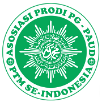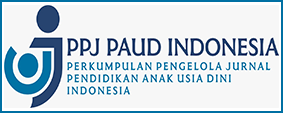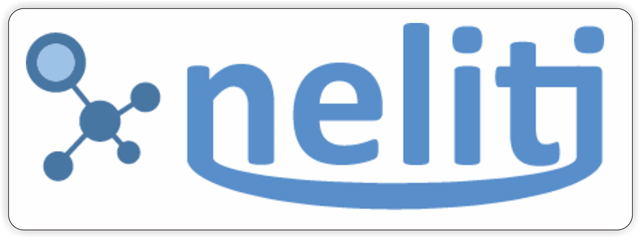The Mediated Learning Experience Method On The Quality of Interaction Between Mothers and Children
(1) Universitas Negeri Makassar
(2) Universitas Negeri Makassar
(3) Universitas Negeri Makassar
(4) Universitas Negeri Makassar
(5) Universitas Negeri Makassar
(*) Corresponding Author
DOI: https://doi.org/10.26858/tematik.v9i1.46309
Abstract
Keywords
Full Text:
PDFReferences
Emmanouil, S., & Georgios, B. (2018). Mediated learning experience and its role in teaching fractions to pupils with learning difficulties. International Journal of Learning and Teaching, 10(2), 158–165. https://doi.org/10.18844/ijlt.v10i2.3410
Farrell, T., Alani, H., & Mikroyannidis, A. (2022). Mediating learning with learning analytics technology: Guidelines for practice. Teaching in Higher Education, 1–21. https://doi.org/10.1080/13562517.2022.2067745
Gidion, H., Mangunsong, F. M., & Tjakrawiralaksana, M. A. (2021). Penerapan Program Mediated Learning Experience (MLE) dalam Meningkatkan Interaksi Pengasuh dengan Anak Usia 3-4 Tahun. Jurnal Ilmiah Psikologi Mind Set, 12(01), 21–30. https://doi.org/10.35814/mindset.v12i01.1783
González, H. L., Palencia, A. P., Umaña, L. A., Galindo, L., & Villafrade M, L. A. (2008). Mediated learning experience and concept maps: A pedagogical tool for achieving meaningful learning in medical physiology students. Advances in Physiology Education, 32(4), 312–316. https://doi.org/10.1152/advan.00021.2007
Graziano, A.M & Raulin, M. L. (2014). Research Methods: A Process of Inquiry. USA : Pearson Education
Keung, A. Y., Ho, V. F., & Shum, K. K. (2022). Early cognitive intervention using mediated learning for preschoolers with developmental delay: A randomized controlled trial. British Journal of Educational Psychology, 92(3), 1109–1132. https://doi.org/10.1111/bjep.12490
Léniz-Maturana, L., Vilaseca, R., & Leiva, D. (2023). Non-Intrusive Maternal Style as a Mediator between Playfulness and Children’s Development for Low-Income Chilean Adolescent Mothers. Children, 10(4), 609. https://doi.org/10.3390/children10040609
Lidz, C. S. (2014). Leaning Toward a Consensus About Dynamic Assessment: Can We? Do We Want To? Journal of Cognitive Education and Psychology, 13(3), 292–307. https://doi.org/10.1891/1945-8959.13.3.292
Misch, D. M. (2017). 33.5 Self-Control and the Developing Brain. Journal of the American Academy of Child & Adolescent Psychiatry, 56(10), S50. https://doi.org/10.1016/j.jaac.2017.07.196
Mutekwe, E. (2014). Unpacking Student Feedback as a Basis for Metacognition and Mediated Learning Experiences: A Socio-cultural perspective. Journal of Education and Learning (EduLearn), 8(4), 338–348. https://doi.org/10.11591/edulearn.v8i4.381
Permatahati, H. I. B., Pudjiati, S. R. R., & Savitri, L. S. Y. (2019). Penerapan Metode Mediated Learning Experience (MLE) pada Ibu dengan Anak Usia 3-4 Tahun untuk Meningkatkan Kualitas Interaksi dalam Kegiatan Pemberian Makan. Provitae: Jurnal Psikologi Pendidikan, 12(2). https://doi.org/10.24912/provitae.v12i2.6256
Sandoval-Obando, E. E., Moreno Doña, A., Walper Gormáz, K., Leguizamón Martínez, D., & Salvador Bertone, M. (2018). Pedagogical Strategies to Promote Mediated Learning Experiences in Vulnerable Contexts. Universitas Psychologica, 17(5), 1–13. https://doi.org/10.11144/Javeriana.upsy17-5.pspm
Shay, A. (2017). Mediated Learning Experience: Choosing Cognitive Modifiability. Psychology and Behavioral Science International Journal, 2(2). https://doi.org/10.19080/PBSIJ.2017.02.555583
Todor, O., Gomoescu, M., & Spiru Haret University, Brasov. (2019). The Importance Of Mediated Learning In Primary School Education. Series VII - Social Sciences and Law, 61(12)(2), 295–314. https://doi.org/10.31926/but.ssl.2019.12.61.2.13
Triani, L., Hartati, S., & Meilani, R. S. M. (2021). Tueak Serembeak: The Role of Parenting in Early Character Development and Education. JPUD - Jurnal Pendidikan Usia Dini, 15(2), 281–299. https://doi.org/10.21009/JPUD.152.05
Tzuriel, D. (2013). Mediated Learning Experience and Cognitive Modifiability. Journal of Cognitive Education and Psychology, 12(1), 59–80. https://doi.org/10.1891/1945-8959.12.1.59
Tzuriel, D. (2019). Mother-Child Mediated Learning Experience Strategies and Children’s Cognitive Modifiability: Theoretical and Research Perspectives. In V. Trif (Ed.), Educational Psychology—Between Certitudes and Uncertainties. IntechOpen. https://doi.org/10.5772/intechopen.80976
Tzuriel, D., & Caspi, R. (2017). Intervention for peer mediation and mother-child interaction: The effects on children’s mediated learning strategies and cognitive modifiability. Contemporary Educational Psychology, 49, 302–323. https://doi.org/10.1016/j.cedpsych.2017.03.005
Article Metrics
Abstract view : 279 times | PDF view : 53 timesRefbacks
- There are currently no refbacks.
Copyright (c) 2023 Fitriani Dzulfadhilah; Sri Rika Amriani; Angri Lismayani; Rika Kurnia R.; Parwoto

This work is licensed under a Creative Commons Attribution-NonCommercial 4.0 International License.
Published by:
Program Studi Pendidikan Guru Pendidikan Anak Usia Dini, Fakultas Ilmu Pendidikan, Universitas Negeri Makassar
Kerjasama:
Support by:
Email: [email protected]
p-ISSN: 2476 - 9363
e-ISSN: 2723 - 7613

TEMATIK: Jurnal Pemikiran dan Penelitian Pendidikan Anak Usia Dini is licensed under a Creative Commons Attribution-NonCommercial 4.0 International License.
View My Stats


























